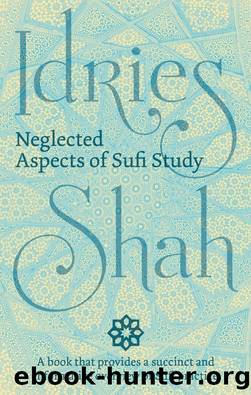Neglected Aspects of Sufi Study by Idries Shah

Author:Idries Shah
Language: eng
Format: epub
Publisher: ISF Publishing
Published: 2017-03-15T00:00:00+00:00
And so we have the famous saying in a celebrated poem by the thirteenth century teacher Rumi that the Sufi is âmade wise by the Truthâ, for he is not âa scholar from a bookâ. The book, for the Sufi, is something which fills an instrumental, not an informational or mental exercise role.
Failure to observe the secondary, what I have called lower-level stabilisation of the study and action of Sufism, as âwater finding its own levelâ, is the direct (and, to the Sufi, as probably to the anthropologist, plainly observable) cause of the theologised, formalistic, mechanical and quasi-academic versions of so-called Sufism in both the East and West. This is most easily demonstrated in the work of orientalist, religiously didactic and ecstasy-oriented individuals and groups whom the late twentieth-century upsurge of interest in our subject has stirred into a frenzy of propaganda and publication; not to mention the also secondary but understandable phenomenon of vituperation directed at those who try to redirect attention to the customary approach which, after all, is abundantly documented in a large number of the extant Sufi classics, upon which both scholarly â derivative â research and âdervish exercisesâ â mimetic behaviour â are allegedly, but in the event highly selectively, based.
But if by Sufi definition (and surely we must listen to it) the real development of Sufism and its applications is not to be found in academic work or in random or uninstructed experimentation; and if Sufism is to be absorbed by such a judicious process as might be comparable to the working with a master of an art rather than a profession, what of the other widespread and â to some â quite attractive alternative? After all, there are in the West and always have been in the East large and small groups of people and plenty of vociferous individuals as well, who maintain that Sufism, being grounded in experience, and not being available through static scholasticism or automatistic piety, should and must be cultivated by means of overrunning the emotions, by listening to or playing music, by dancing and wearing strange clothes, by changing oneâs name, and by slavishly following what the participants imagine to be the literal instructions of some preferably ancient and revered but long-dead teacher. Such people, in the nature of things, have far greater social visibility than the often much more inhibited scholars: they and their works are to be found in a larger and much more animated constituency. Because of this, many ordinary people lump them together with all the other cultists, members of esotericist groupings with dauntingly formidable names and even greater pretensions. They call them ânutsâ and politely avoid them. I, for one, would not blame anyone for concluding that they are dealing with just another yogic, Hindu, Zen or similar group. Perhaps, though, they are not strictly similar. But it is equally true to say that such coteries are not Sufi ones in the sense that âSufiâ is employed by the traditional teachers or by contemporary Sufis who maintain a wider tradition and more comprehensive approach.
Download
This site does not store any files on its server. We only index and link to content provided by other sites. Please contact the content providers to delete copyright contents if any and email us, we'll remove relevant links or contents immediately.
The History of Jihad: From Muhammad to ISIS by Spencer Robert(2628)
Nine Parts of Desire by Geraldine Brooks(2368)
The Turkish Psychedelic Explosion by Daniel Spicer(2356)
The First Muslim The Story of Muhammad by Lesley Hazleton(2271)
The Essential Rumi by Coleman Barks(2046)
1453 by Roger Crowley(2030)
The Last Mughal by William Dalrymple(1857)
Trickster Travels: A Sixteenth-Century Muslim Between Worlds by Davis Natalie Zemon(1847)
Muhammad: His Life Based on the Earliest Sources by Martin Lings(1646)
God by Aslan Reza(1641)
by Christianity & Islam(1632)
A Concise History of Sunnis and Shi'is by John McHugo(1567)
No God But God by Reza Aslan(1545)
Magic and Divination in Early Islam by Emilie Savage-Smith;(1534)
The Flight of the Intellectuals by Berman Paul(1503)
Nothing to Envy by Barbara Demick(1450)
Art of Betrayal by Gordon Corera(1430)
What the Qur'an Meant by Garry Wills(1394)
Getting Jesus Right: How Muslims Get Jesus and Islam Wrong by James A Beverley & Craig A Evans(1342)
